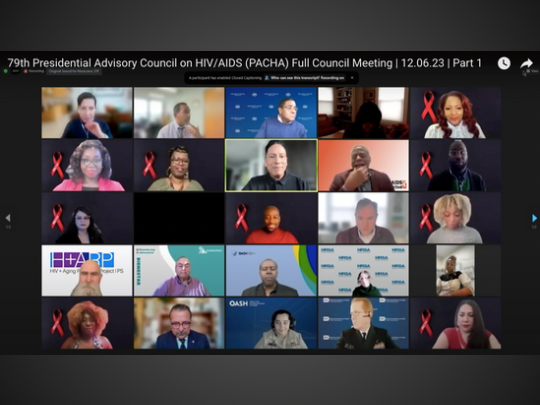
The final meeting of the Presidential Advisory Council on HIV/AIDS (PACHA) took place virtually on December 8, 2023. During its 79th full committee meeting, PACHA engaged community members in a “PACHA-to-the-People” community engagement program and reflected on 2023. It also heard from the Director of the White House Office of National AIDS Policy and three panels.
Vincent Guilamo-Ramos, PhD, MPH, RN, who had been a member of the Council since 2020, was formally introduced during this meeting. Jeff Taylor, Executive Director of the HIV and Aging Research Project in Palm Springs, California, was also welcomed by the Council.
A panel comprised of community members engaged in discussions with people on three topics and shared perspectives with the Council.
Reaching the 2030 Target for a Reduction in HIV Transmissions
The first panel provided information and insights on how to achieve the 90% national reduction target for new HIV transmissions by 2030. The conversation was opened by Harold Phillips, MRP, the then-Director of the Office of National AIDS Policy at the White House, who made observations about the significant accomplishments of both the National HIV/AIDS Strategy and Ending the HIV Epidemic in the U.S. program. We are not on track to accomplish the national HIV targets, despite the fact that the country is making progress in the right direction and that not all groups and communities are progressing at the same rate. This, he said, may serve as a wake-up call to quicken federal, state, and community actions and focus efforts on the most important populations and communities with specialized strategies. Participants from various communities discussed the current state of the goal’s progress and what can be done to hasten it. See the discussion’s Return Disclaimer.
Long-term and Lifelong HIV Survivors
The next panel, which focused on the needs of those three groups, was organized by PACHA’s new Aging with HIV, Long-Term & Lifetime Survivors Subcommittee. Presenters talked about medical issues like the comorbidities that HIV patients experience and the need for more education for the healthcare workforce. They also shared their personal experiences with HIV and lifetime survivors and highlighted important policy issues that could enhance their care, services, and outcomes. View the Exit Disclaimer of this panel discussion and the slides from this session here (PDF, 2.88MB) and here (747KB).
HIV and Transgender People
The final panel looked at the HIV needs of transmasculine and intersex people, a group that is occasionally underrepresented in discussions about HIV prevention and care. The need for more and better inclusion of transmasculine individuals in data and research, improved mental health and sexual health services, and increased awareness of and access to HIV prevention and care services were all discussed by three Black transmasculine panelists. They also shared their experiences, observations about their intersecting identities, and suggestions for using diverse language. View the Exit Disclaimer for this discussion.
PACHA-to-the-People
During the PACHA-to-the-People community engagement period, a large number of community members shared their observations and requests with the Council. A request for an update on HOPE Act-related organ transplant from HIV donors to HIV recipients, comments about the need for a national PrEP program, encouragement to involve more healthcare providers serving adolescents in HIV prevention and testing, and more pharmacists in PrEP services were among the topics covered. Medicare and Medicaid were also asked to pay closer attention to viral suppression outcomes among HIV beneficiaries. View the conversation’s Exit Disclaimer.
Announced Dates for PACHA Meetings in 2024
The next PACHA meeting will be held in Houston, Texas, from March 27 to March 28, 2024. HIV-related information is available on the other 2024 sessions. More information will be posted as it becomes available on the government’s PACHA site.



